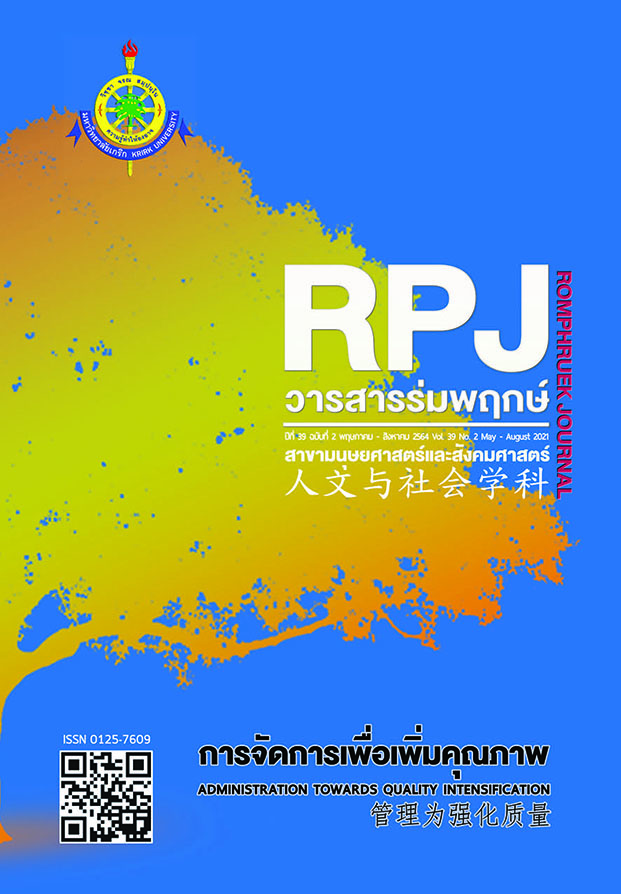Innovative Thinking Skills Factors Related to Innovative Thinking Skills of Teachers under the Office of Secondary Education Service Area 5 in ang Thong Province
Main Article Content
Abstract
The objectives of this research were to 1) investigate the level of innovative thinking skills of the teachers under the Office of the Secondary Educational Service Area 5, Ang Thong Province, 2) analyze the relationship of the factors related to the teachers' innovative thinking skills, and 3) analyze the factors related to the teachers' innovative thinking skills under the Office of the Secondary Educational Service Area 5, Ang Thong Province. The questionnaire was used as a tool for collecting data. The population for the study was 692 teachers under the Secondary Educational Service Area Office 5, Ang Thong Province. The statistics used to analyze the data were percentage, mean, standard deviation, Pearson's Correlation Coefficient Analysis and stepwise multiple regression analysis.
The results of the research showed that the level of innovative thinking skills of the respondents were at high level. When considering at each skill, the communication skills received the highest mean. On the other hand, the creative skills received the lowest mean. In terms of the factors related to the respondents' overall and each aspect of the innovative thinking skills, they were found at high level. With regard to the relationship between factors involved in the respondents’ innovative thinking skills, the factors of the society acceptance, and the relationship with their colleagues were positively related to the respondents’ innovative thinking skills at high level, at the statistical significance of .01 level, (p = 0.631 and 0.599, respectively. When adopting the factors of social acceptance, relationship with colleagues, compensation, working context, self-development and collaborative work to predict the respondents’ innovative thinking skills, they were able to jointly predict 50.60 percent (r = 0.711) at statistically significant level of 0.1.
Article Details
Every article published in the Romphruek Journal of the Humanities and Social Sciences is the opinion and point of view of the authors. Thery're not the viewpoint of Krirk University or the editored department. Any part or all of the articles for pablication must be clearly cited.
References
กองบริหารงานวิจัยและประกันคุณภาพการศึกษา. (2560). Thailand 4.0 โมเดลขับเคลื่อนประเทศไทยสู่ความมั่งคั่ง มั่นคง และยั่งยืน. กรุงเทพฯ : กองบริหารงานวิจัยและประกันคุณภาพการศึกษา.
ชยาภา วรรณชยานนท์. (2558). ทักษะการเรียนรู้และนวัตกรรม. (15 กันยายน 2562) สืบค้นจาก www.blog.eduzones.com.
ธงชัย โรจน์กังสดาล. (2559). Innovative Thinking Skills : ค้นหาทักษะในการเป็นผู้สร้างสรรค์ที่เหมาะกับตัวคุณ. กรุงเทพฯ : พีเพิล แวลู โซลูชั่น โพรไวเดอร์ จำกัด.
ธงชัย สันติวงษ์. (2542). องค์การและการบริหาร. กรุงเทพฯ : ไทยวัฒนาพานิช.
พูลพงษ์ พงษ์วิทยภานุ. (2557). การคิดเชิงนวัตกรรม. ชลบุรี : มหาวิทยาลัยเกษตรศาสตร์.
มารุต พัฒผล. (2562). เอกสารประกอบการบรรยาย เรื่อง ทักษะการโค้ชเพื่อครู. กรุงเทพฯ : วิทยาลัยมหาวิทยาลัย ศรีนครินทรวิโรฒ.
วศิน ชูชาติ. (2559). ปัจจัยที่ส่งผลต่อความสามารถในการจัดการเรียนรู้ของครูเพื่อส่งเสริมทักษะการเรียนรู้ของผู้เรียนแห่งศตวรรษที่ 21 จังหวัดสุพรรณบุรี. คณะศึกษาศาสตร์ สาขาพัฒนศึกษา มหาวิทยาลัยศิลปากร, กรุงเทพฯ.
วสันต์ สุทธาวาศ และ ประสพชัย พสุนนท์. (2558). ปัจจัยที่ส่งผลต่อพฤติกรรมสร้างนวัตกรรมระดับบุคคลในสำนักงานคณะกรรมการการศึกษาขั้นพื้นฐาน. วารสารมนุษยศาสตร์ สังคมศาสตร์ และศิลปะ, 8(1), 530-545.
ศรัณยู ศิริเจริญธรรม. (2556). ปัจจัยจูงใจที่ส่งผลต่อความเป็นครูมืออาชีพของครูในสถานศึกษาขั้นพื้นฐาน สังกัดสำนักงานเขตพื้นที่การศึกษาประถมศึกษาจันทบุรี. คณะครุศาสตร์ สาขาบริหารการศึกษา มหาวิทยาลัยราชภัฏรำไพพรรณี, จันทบุรี.
เสนาะ ติเยาว์. (2551). หลักการบริหาร. พิมพ์ครั้งที่ 6. กรุงเทพฯ : มหาวิทยาลัยธรรมศาสตร์.
สมยศ นาวีการ. (2549). การบริหารและพฤติกรรมองค์กร. กรุงเทพฯ : ผู้จัดการ.
สมหวัง พิธิยานุวัฒน์. (2543). ข้อเสนอเชิงนโยบายการปฏิรูปวิชาชีพครูตามพระราชบัญญัติการประถมศึกษาแห่งชาติ. กรุงเทพฯ : สำนักงานคณะกรรมการการศึกษาแห่งชาติ สำนักนายกรัฐมนตรี.
สำนักงานเขตพื้นที่การศึกษามัธยมศึกษา เขต 5. (2561). รายงานผลการดำเนินงานประจำปีงบประมาณ 2561. กรุงเทพฯ : สำนักงานคณะกรรมการการศึกษาขั้นพื้นฐาน.
สำนักงานคณะกรรมการอุดมศึกษา. (2550). กรอบแผนอุดมศึกษาระยะยาว 15 ปี ฉบับที่ 2 (พ.ศ. 2551 - 2565). กรุงเทพฯ : โรงพิมพ์แห่งจุฬาลงกรณ์มหาวิทยาลัย.
สำนักงานรับรองมาตรฐานและประเมินคุณภาพการศึกษา(องค์การมหาชน). (2555). คู่มือการประเมินคุณภาพภายนอกรอบสาม (2554-2558) ระดับอุดมศึกษา ฉบับสถานศึกษาแก้ไข เพิ่มเติม พฤศจิกายน 2554. กรุงเทพฯ : สำนักงานรับรองมาตรฐานและประเมินคุณภาพการศึกษา (องค์การมหาชน).
สำนักงานเลขาธิการสภาการศึกษา. (2560). แผนการศึกษาชาติ พ.ศ. 2560-2579. กรุงเทพฯ : บริษัทพริกไทยหวาน จำกัด.
อนุชา โสมาบุตร. (2556). ทักษะการเรียนรู้และนวัตกรรม สำหรับการเรียนรู้แห่งศตวรรษที่ 21. (19 กันยายน 2562) สืบค้นจาก www. teacherweekly.wordpress.com.
อรชร ปราจันทร์. (2560). รูปแบบการบริหารเพื่อพัฒนาทักษะการคิดเชิงนวัตกรรมของครูในสถานศึกษาขั้นพื้นฐาน. คณะศึกษาศาสตร์ สาขาบริหารการศึกษา มหาวิทยาลัยนเรศวร, พิษณุโลก.
Herzberg, F., Bemard, M., & Barbara, S. (1959). The motivation to work (2nd ed.). New York : John Willey & Sons.
Kwakman, C. H. E. (2003). Factors affecting teachers' participation in professional learning activities. Teaching and teacher education. 19(2), 149-170.


